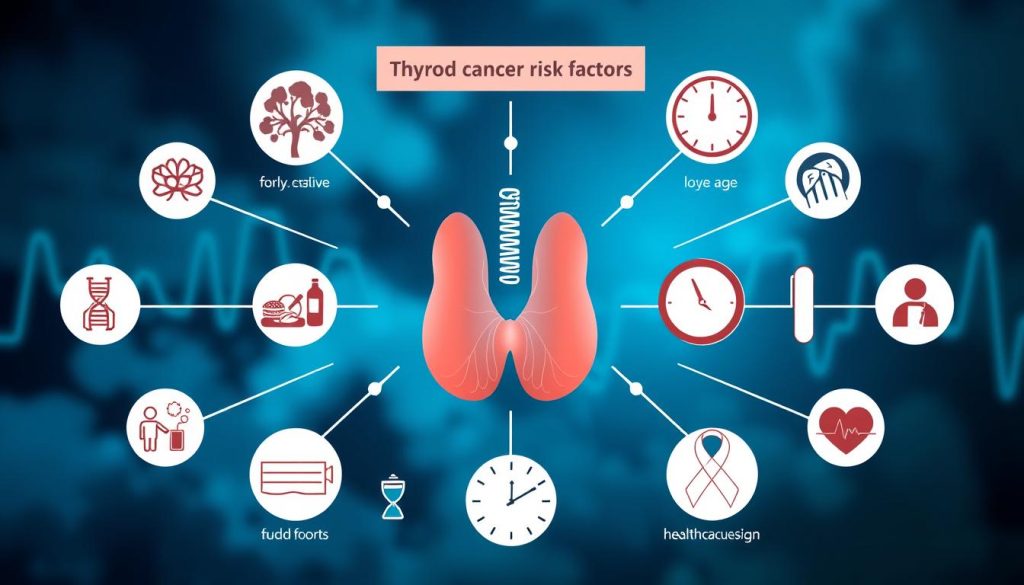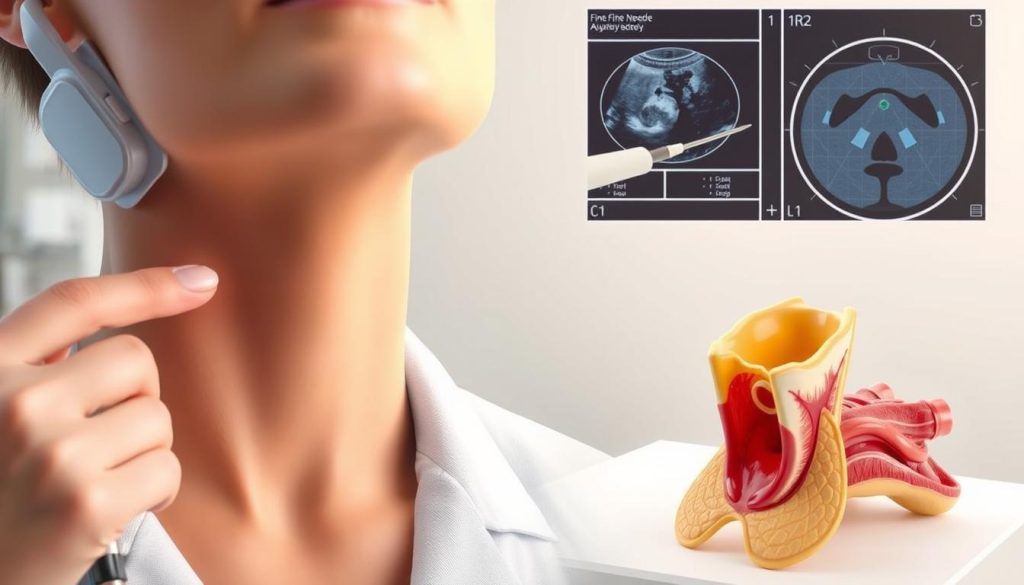Thyroid cancer is a serious condition that affects many Americans each year. This guide will help you understand thyroid cancer, from its early signs to the latest treatments. We’ll look at the different types of thyroid cancer, how they affect the body, and the path from diagnosis to recovery.
We want to give you clear, caring information if you have thyroid cancer or if you’re supporting someone who does. We mix medical knowledge with real-life stories. Our goal is to give you the power to understand and deal with this tough condition.
We’ll cover the basics of thyroid function, risk factors, and the newest ways to treat thyroid cancer. Whether you’re just starting to learn about it or want to know more, this guide is here to help. It’s packed with useful info to help you understand thyroid cancer better.
What is Thyroid Cancer: Basic Understanding of Thyroid Malignancy
Thyroid cancer happens when cells in the thyroid gland grow too much. It affects thousands yearly. Knowing about thyroid cancer helps patients and families deal with it.
Structure and Function of the Thyroid Gland
The thyroid gland is at the neck’s base. It makes hormones that control metabolism, heart rate, and temperature. This butterfly-shaped organ is vital for health.
How Cancer Develops in Thyroid Tissue
Cancer starts with genetic changes that make cells grow fast. In thyroid cancer, these cells form tumors. These can be harmless nodules or cancer. An enlarged thyroid, or goiter, might also happen but isn’t always cancer.
Impact on Hormonal Balance
Thyroid cancer can mess with hormone levels. This affects many body functions. Symptoms include weight changes, fatigue, and mood swings. Early treatment is important to manage these effects.
| Type | Characteristics | Hormone Impact |
|---|---|---|
| Papillary | Most common, slow-growing | Minimal |
| Follicular | Less common, can spread to bones | Moderate |
| Medullary | Rare, often hereditary | Severe |
| Anaplastic | Aggressive, fast-growing | Severe |
Risk Factors and Causes of Thyroid Cancer
Knowing about thyroid cancer risk factors is key to catching it early. While we don’t know the exact cause, some factors can up your risk.

Radiation is a big risk factor. If you had radiation therapy to your head or neck, you’re at higher risk. This is true, even if it was when you were a kid. Environmental disasters like nuclear accidents can also raise thyroid cancer rates in affected areas.
Genetics also matter. If your family has a history of thyroid cancer or certain genetic conditions, you might be at higher risk. Women are more likely to get thyroid cancer than men. And the risk goes up as you get older.
Other possible risk factors include:
- Iodine deficiency or excess
- Certain inherited genetic syndromes
- Being overweight or obese
- Having a history of goiter
Having one or more risk factors doesn’t mean you’ll definitely get thyroid cancer. Many people with these risks never get it. And some without any known risks do. Regular check-ups and watching for neck changes can help catch it early.
Types of Thyroid Cancer and Their Characteristics
Thyroid cancer has different types, each with its own features. Knowing these helps both patients and doctors make better treatment choices.
Papillary Thyroid Cancer
Papillary thyroid cancer is the most common. It grows slowly and can spread to nearby lymph nodes. But, it has a good chance of survival.
Follicular Thyroid Cancer
Follicular thyroid cancer is less common. It can spread through blood vessels to other parts of the body. Early detection improves its prognosis.
Medullary Thyroid Cancer
Medullary thyroid cancer starts in C cells. It can run in families and is linked to genetic syndromes. Finding and treating it is harder than other types.
Anaplastic Thyroid Cancer
Anaplastic thyroid cancer is rare but aggressive. It grows and spreads quickly. It’s the most serious type and needs immediate treatment.
| Type | Prevalence | Growth Rate | Prognosis |
|---|---|---|---|
| Papillary | 80% | Slow | Excellent |
| Follicular | 10-15% | Moderate | Good |
| Medullary | 2-3% | Variable | Fair |
| Anaplastic | 1-2% | Rapid | Poor |
Early Warning Signs and Symptoms
Spotting thyroid cancer symptoms early is key to better health. Neck swelling is often the first sign. It might look like a lump or nodule in the neck, visible when you swallow.
Voice changes, like hoarseness or trouble speaking, can also hint at thyroid problems.

- Difficulty swallowing
- Persistent sore throat
- Neck pain
- Enlarged lymph nodes
If these symptoms stick around, it’s time to see a doctor. They might not always mean cancer, but catching it early is vital. Learning about health conditions helps you make smart choices for your health.
| Symptom | Description | Action |
|---|---|---|
| Neck swelling | Visible lump or nodule in neck | Consult doctor immediately |
| Voice changes | Hoarseness or speaking difficulty | See ENT specialist |
| Swallowing issues | Pain or discomfort when swallowing | Schedule medical evaluation |
Keep in mind, symptoms can differ from person to person. Some might notice many signs, while others might not see any. Regular health checks and self-exams can spot thyroid issues early.
Understanding Thyroid Nodules and Goiter Development
Thyroid nodules and goiters are common issues with the thyroid gland. They can worry people, but knowing what they are is key to handling them right.
Benign vs. Malignant Nodules
Thyroid nodules are lumps in the thyroid gland. Most are not cancerous, but a few can be. Benign ones might not need treatment, but cancerous ones need quick action.
| Characteristic | Benign Nodules | Malignant Nodules |
|---|---|---|
| Growth Rate | Slow | Rapid |
| Texture | Soft or rubbery | Hard and fixed |
| Pain | Usually painless | May cause discomfort |
Goiter Formation and Cancer Risk
A goiter is an enlarged thyroid gland. It can happen due to iodine lack or thyroid problems. Most goiters are not cancerous, but they might raise cancer risk.
When to Seek Medical Attention
If you find a lump in your neck or have trouble swallowing or speaking, see a doctor. Finding thyroid nodules or goiters early is vital for good treatment and cancer prevention.
- Visible neck swelling
- Trouble breathing or swallowing
- Unexplained voice changes
- Neck pain or discomfort
Regular doctor visits and self-checks can spot thyroid problems early. Most thyroid nodules are not harmful, but a doctor’s check is important for your peace of mind and care.
Diagnostic Procedures for Thyroid Cancer
Diagnosing thyroid cancer involves several steps. Doctors use physical exams, blood tests, and imaging studies. These help find thyroid problems.
A key step is the fine needle aspiration biopsy. It’s a small procedure to take cells from nodules for a closer look.

Ultrasound imaging is also important. It helps see thyroid nodules and guide the biopsy. It shows the size, shape, and type of nodules, helping to assess the risk.
Blood tests check thyroid hormone levels and tumor markers. They give insight into thyroid function, though they’re not a sure sign of cancer.
| Diagnostic Procedure | Purpose |
|---|---|
| Physical Exam | Detect visible lumps or swelling |
| Blood Tests | Assess thyroid hormone levels |
| Ultrasound | Visualize nodules and guide biopsy |
| Fine Needle Aspiration | Extract cells for microscopic analysis |
At times, more tests like CT scans or radioiodine scans are needed. They help understand how far the disease has spread.
Stages of Thyroid Cancer and Disease Progression
Knowing the stages of thyroid cancer is key to finding the right treatment. Doctors use the TNM system to figure out how far the cancer has spread.
TNM Classification System
The TNM system looks at the tumor, nodes, and metastasis. It shows the tumor size, if it’s in lymph nodes, and if it’s spread to other areas.
Stage-Specific Prognosis
The cancer stage greatly affects a patient’s outlook. Early-stage cancers usually have a better chance of recovery than later stages.
Survival Rates by Stage
Thyroid cancer survival rates are high, thanks to early detection. Here are the 5-year survival rates by stage:
| Stage | 5-Year Relative Survival Rate |
|---|---|
| Localized (Stage I) | Near 100% |
| Regional (Stage II-III) | 98% |
| Distant (Stage IV) | 55% |
Keep in mind, these are averages. Many people with thyroid cancer live a long time, even with later stages. Your doctor can give a more accurate prognosis based on your situation.
Thyroidectomy: Surgical Treatment Options
Thyroidectomy is a key surgery for thyroid cancer. It involves removing part or all of the thyroid gland. This depends on the cancer’s size and type.

For small, localized cancers, a partial thyroidectomy might be chosen. This keeps some thyroid function. It might also mean less need for hormone therapy later on.
When cancer is widespread or aggressive, a total thyroidectomy is usually the choice. This removes the whole gland, getting rid of the cancer. But, it means needing hormone supplements for life.
Thyroid cancer surgery comes with risks. These include:
- Damage to the laryngeal nerves
- Hypoparathyroidism
- Bleeding or infection
- Voice changes
Recovery from thyroidectomy takes weeks. Patients might feel neck pain and be tired. Most can get back to normal in 10-14 days after surgery.
| Procedure | Description | Recovery Time |
|---|---|---|
| Partial Thyroidectomy | Removes one lobe of the thyroid | 1-2 weeks |
| Total Thyroidectomy | Removes entire thyroid gland | 2-3 weeks |
| Lymph Node Dissection | Removes nearby lymph nodes | 2-4 weeks |
The choice of surgery depends on the tumor size, lymph nodes, and cancer type. Your surgeon will pick the best option for you. They aim to treat the cancer well while avoiding complications.
Radioactive Iodine Treatment: Purpose and Process
Radioactive iodine treatment is key in fighting thyroid cancer. It uses iodine to kill leftover thyroid cells after surgery. This method works best for cancers that take up iodine well.
Preparation for Treatment
Before starting radioactive iodine treatment, patients must prepare:
- Follow a low-iodine diet for 1-2 weeks
- Stop taking thyroid hormone medication
- Avoid iodine-containing medications and supplements
- Women must not be pregnant or breastfeeding
Post-Treatment Care
After treatment, patients must protect others from radiation:
- Limit close contact with others, specially children and pregnant women
- Use separate utensils and bathroom facilities
- Drink plenty of fluids to flush out remaining radioactive material
Side Effects Management
Though rare, some side effects can happen:
| Side Effect | Management Strategy |
|---|---|
| Neck tenderness | Apply cold compresses, take pain relievers |
| Dry mouth | Drink water frequently, use sugar-free gum |
| Nausea | Eat small, frequent meals, take anti-nausea medication |
| Fatigue | Rest as needed, maintain light physical activity |
Knowing the process and how to handle side effects makes treatment easier.
Thyroid Hormone Therapy After Treatment
After thyroid cancer treatment, patients often need thyroid hormone therapy. This is a key part of managing thyroid cancer. It helps replace lost thyroid function and keeps the body running smoothly. Doctors give synthetic hormones to mimic the natural thyroid gland’s work.
Thyroid hormone therapy has two main goals. First, it replaces hormones your body can’t make anymore. Second, it helps prevent cancer from coming back by controlling thyroid-stimulating hormone (TSH) levels.
Finding the right dose is very important. Your doctor will run blood tests to check hormone levels and adjust your medication as needed. It may take some time to find the perfect balance, but patience is important.
| Thyroid Hormone Therapy Benefits | Considerations |
|---|---|
| Replaces lost thyroid function | Regular blood tests needed |
| Suppresses possible cancer recurrence | Dose adjustments may be necessary |
| Maintains overall health | Possible side effects (e.g., heart palpitations) |
| Supports metabolism | Lifelong commitment to medication |
Long-term management of thyroid hormone therapy is essential. You’ll need regular check-ups and may require dose adjustments over time. By working closely with your healthcare team, you can ensure effective thyroid cancer management and maintain your quality of life.
Advanced Treatment Options for Metastatic Disease
For those with metastatic thyroid cancer, new treatments are available. These aim to better the lives of those with advanced thyroid carcinoma.
Targeted Therapies
Targeted therapies target specific molecules that help cancer grow. For metastatic thyroid cancer, drugs like sorafenib and lenvatinib block proteins that tumors need. This can slow the cancer’s spread in some cases.
Immunotherapy Approaches
Immunotherapy boosts the body’s fight against cancer. It’s a new area for thyroid cancer, but drugs like checkpoint inhibitors are showing promise. They help the immune system find and attack cancer cells better.
Clinical Trials
Clinical trials are key in finding new treatments for advanced thyroid carcinoma. They test new therapies and combinations. Patients with metastatic disease can try these new treatments by joining trials.
| Treatment Type | Examples | Potential Benefits |
|---|---|---|
| Targeted Therapy | Sorafenib, Lenvatinib | Slows tumor growth |
| Immunotherapy | Pembrolizumab | Enhances immune response |
| Clinical Trials | Various experimental treatments | Access to new therapies |
These new treatments offer hope for those with metastatic thyroid cancer. As research continues, even better treatments might be found. This could lead to better outcomes for those with advanced disease.
Recovery and Long-term Monitoring
Recovering from thyroid cancer is a long journey. It goes beyond the initial treatment. Patients need to follow up closely to keep their health in check. This includes regular check-ups, blood tests, and imaging studies to spot any signs of cancer coming back early.
Patients often have to make lifestyle changes during recovery. This might mean eating differently, exercising more, or finding ways to manage stress. These changes help keep overall health good and prevent problems.

Long-term monitoring is key for thyroid cancer survivors. Here’s what you can expect:
- Routine blood tests to check thyroid hormone levels
- Neck ultrasounds to detect any new growths
- Whole-body scans to look for cancer spread
- Regular appointments with an endocrinologist
The timing of these follow-up visits varies based on the cancer type and stage. At first, you might see your doctor every few months. As time goes by and there’s no sign of cancer, the visits might become less frequent.
| Follow-up Care Timeline | Frequency | Procedures |
|---|---|---|
| First Year | Every 3-6 months | Blood tests, neck ultrasound |
| Years 2-5 | Every 6-12 months | Blood tests, neck ultrasound, possible whole-body scan |
| After 5 Years | Annually | Blood tests, neck ultrasound as needed |
Remember, every person’s recovery from thyroid cancer is different. Staying committed to follow-up care and talking openly with your healthcare team is vital. It helps ensure your long-term health and well-being.
Living with Thyroid Cancer: Lifestyle Adjustments
Living with thyroid cancer means making big changes to keep life good. People face special challenges that affect their daily life and health. By making smart changes, they can manage their condition better and feel better.
Eating right is key in managing thyroid cancer. Eating a balanced diet helps the body heal and keeps energy up. Before radioactive iodine treatment, eating low in iodine is helpful. Also, regular exercise boosts mood and helps with weight.
Managing stress is important for a good life with thyroid cancer. Activities like meditation, yoga, or deep breathing help lower anxiety. Support groups also offer emotional support and advice from others going through the same thing.
| Lifestyle Area | Adjustment | Benefit |
|---|---|---|
| Diet | Low-iodine meals | Improves treatment effectiveness |
| Exercise | Regular moderate activity | Boosts energy and mood |
| Stress Management | Meditation or yoga | Reduces anxiety, enhances well-being |
| Social Support | Join support groups | Provides emotional comfort |
Talking openly with doctors is very important. Regular visits and talking about symptoms or worries help get the best care. By making these lifestyle changes, people with thyroid cancer can improve their life and health.
Prevention Strategies and Regular Screening
Preventing thyroid cancer starts with knowing your risks and taking action. Some risks can’t be changed, but others can with lifestyle choices. Regular thyroid checks are key for catching cancer early and treating it well.
Risk Reduction Methods
To lower your risk of thyroid cancer, try these:
- Eat a diet full of iodine
- Stay away from too much radiation
- Stop smoking
- Keep your stress levels down
Screening Guidelines
Getting regular thyroid checks is vital for catching cancer early. The American Thyroid Association suggests:
| Age Group | Screening Frequency |
|---|---|
| 20-29 years | Every 5 years |
| 30-39 years | Every 3 years |
| 40+ years | Annually |
Self-examination Techniques
Doing self-exams can spot thyroid problems early. Stand in front of a mirror and look for neck lumps or swelling. Feel your neck while swallowing water. If you find anything odd, see your doctor right away. Remember, early detection is critical for beating cancer, including thyroid and bone marrow types.
Support Resources and Patient Communities
Facing thyroid cancer can be tough, but you’re not alone. Many groups offer support to help you and your family. The American Thyroid Association provides educational resources and connects you with doctors. ThyCa: Thyroid Cancer Survivors’ Association offers lots of information, including local support groups and an annual conference.
Online patient communities are key for emotional support and advice. The Thyroid Cancer Support Group on Facebook lets members share and ask questions. CancerCare hosts online support groups led by oncology social workers, creating a safe space for thyroid cancer patients to connect.
Local hospitals often organize thyroid cancer support groups. These groups let you meet others face-to-face. Sharing coping strategies and making friends can be very helpful. Remember, asking for help is a sign of strength, not weakness. Being part of patient communities can bring comfort, knowledge, and hope to your journey.
FAQ
Q: What are the early warning signs of thyroid cancer?
A: Early signs of thyroid cancer include a lump in the neck and changes in voice. You might also experience difficulty swallowing or neck pain. It’s important to remember these symptoms can also be from other health issues. If you notice them, see a doctor right away.
Q: How is thyroid cancer diagnosed?
A: Doctors use several methods to diagnose thyroid cancer. They do a physical exam, blood tests, and imaging studies like ultrasound. A fine needle aspiration (FNA) biopsy is also used. This involves taking cells from a nodule for examination.
Q: What are the different types of thyroid cancer?
A: There are four main types of thyroid cancer. Papillary cancer is the most common, making up about 80% of cases. Follicular cancer is the second most common, at 10-15%. Medullary and anaplastic cancers are less common but more aggressive.
Q: What is a thyroidectomy?
A: A thyroidectomy is a surgery to remove part or all of the thyroid gland. It’s often needed for thyroid cancer. The surgery can be partial or total, depending on the cancer’s size and type.
Q: What is radioactive iodine treatment?
A: Radioactive iodine treatment is used after surgery for some thyroid cancers. It involves taking a capsule or liquid that kills cancer cells. This treatment helps get rid of any remaining cancer cells.
Q: How does thyroid cancer affect hormonal balance?
A: Thyroid cancer and its treatment can affect hormone levels. The thyroid gland is important for metabolism and body temperature. If it’s affected, patients may need lifelong hormone replacement therapy.
Q: What are the risk factors for developing thyroid cancer?
A: Several factors increase the risk of thyroid cancer. These include radiation exposure, family history, and certain genetic conditions. Being female and older also increases the risk. But having a risk factor doesn’t mean you’ll definitely get cancer.
Q: How is thyroid cancer treated?
A: Treatment for thyroid cancer includes surgery, radioactive iodine therapy, and hormone replacement. It also includes radiation therapy and targeted drugs for advanced cases. The treatment plan depends on the cancer type and stage.
Q: What is the prognosis for thyroid cancer?
A: The prognosis for thyroid cancer is usually good, with a 5-year survival rate of nearly 100% for early stages. Even for more advanced cases, the survival rate is around 98%. But, the prognosis can vary based on several factors.
Q: How often should I get screened for thyroid cancer?
A: There are no standard screening guidelines for thyroid cancer. But, people with risk factors should talk to their doctor about screenings. This might include regular exams, blood tests, or imaging studies. Checking your neck for lumps is also important.

















